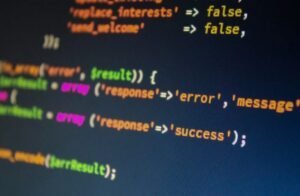Getting Into AI Without a Degree
Artificial Intelligence (AI) is a rapidly growing field that has tremendous potential for individuals who are interested in technology, problem-solving, and innovation. While many believe that a degree in computer science or related fields is necessary to enter this field, there are several alternative paths to getting started in AI. This article explores different ways for individuals to break into AI without formal education, providing useful insights and resources.
Key Takeaways:
- AI offers exciting opportunities for individuals without a formal degree in computer science.
- There are multiple pathways to gain knowledge and experience in AI.
- Building a strong portfolio and pursuing relevant certifications can enhance your chances of success in the field.
- Networking and joining AI communities can provide valuable connections and insights.
1. Online Courses and Tutorials: The internet is a treasure trove of AI resources, with numerous online courses and tutorials available to help you learn the fundamentals of AI. Websites like Coursera, edX, and Udemy offer a variety of introductory and advanced AI courses.
Many top universities provide their AI course materials online for free, allowing you to access high-quality education at your own pace.
2. Open-Source Projects: Contributing to open-source AI projects is an excellent way to gain hands-on experience and showcase your skills to potential employers. OpenAI and TensorFlow are just a couple of the many platforms that offer opportunities for collaboration.
Being part of an open-source project not only allows you to work on real-world AI problems but also exposes you to the expertise of experienced professionals.
3. Building Your Portfolio: In the field of AI, practical experience is highly valued. Start by working on personal projects that demonstrate your understanding of AI concepts and techniques. Building a portfolio of projects can serve as evidence of your skills and capabilities to potential employers.
By selecting diverse AI projects, you can showcase your versatility and adaptability.
| Table 1: Popular AI Frameworks | Table 2: AI Programming Languages |
|---|---|
|
|
4. Online AI Communities: Joining AI communities, forums, and discussion groups allows you to connect with like-minded individuals, ask for advice, and stay updated with the latest trends in AI development. Websites such as Kaggle, Reddit’s r/MachineLearning, and GitHub are popular platforms for AI enthusiasts.
Being an active participant in these communities enables you to learn from others, collaborate on projects, and discuss new ideas.
| Table 3: In-Demand AI Skills |
|---|
|
5. Certifications: While a degree is not essential, earning relevant certifications can help demonstrate your commitment to AI and make you a more competitive candidate in the job market. Certifications in machine learning, AI frameworks, or specific industry applications can give you an edge.
Companies are increasingly valuing certified professionals who have practical expertise in implementing AI solutions.
By following these alternative paths, you can gain the necessary knowledge and practical skills to pursue a career in AI. Remember, dedication, self-motivation, and continuous learning are essential in this rapidly evolving field. Seize every opportunity to grow, collaborate, and contribute to the exciting world of artificial intelligence.

Common Misconceptions
Misconception 1: AI can only be pursued with a degree
One of the common misconceptions surrounding getting into AI is that it can only be achieved through obtaining a formal degree. While a degree can provide a solid foundation in the field, it is not the only path to entering the AI industry.
- Attending AI boot camps or short-term certificate programs can be a practical alternative to a formal degree.
- Building a strong portfolio of AI projects and demonstrating practical skills can make up for the lack of a degree.
- Self-learning through online resources, tutorials, and practical experimentation is a viable option for getting into AI without a formal degree.
Misconception 2: AI is only for people with a strong mathematical background
Another misconception is that only individuals with strong mathematical skills can pursue a career in AI. While a solid understanding of math is undoubtedly beneficial, it is not the sole determining factor for success in the field of AI.
- Collaborating with professionals from different backgrounds, such as software engineering or data analysis, can complement the skills needed in AI.
- Utilizing AI frameworks and pre-existing algorithms eliminates the need for advanced mathematical skills in many cases.
- Focused learning on AI concepts and implementation can compensate for any deficiencies in mathematical knowledge.
Misconception 3: AI is only for experts
There is a common misconception that AI is an exclusive field only for experts and researchers. However, this belief fails to acknowledge the growing accessibility of AI technology and the expanding opportunities for individuals without extensive expertise.
- Online communities and forums provide support and guidance for AI enthusiasts at all skill levels.
- Various online courses and tutorials cater to beginners, gradually guiding them towards advanced AI concepts.
- AI platforms and tools with user-friendly interfaces are becoming more prevalent, making it easier for non-experts to explore and implement AI solutions.
Misconception 4: AI is a purely technical field
While AI is undoubtedly a technical field, it is a misconception to think that technical skills are the only requirement for working in AI. Many non-technical skills play a vital role in the successful implementation and adoption of AI.
- A strong understanding of problem-solving and critical thinking is essential in developing effective AI solutions.
- Communication and collaboration skills are crucial for working in interdisciplinary AI teams and effectively conveying complex ideas and concepts.
- Continuous learning and adaptability are important to keep up with the rapidly evolving landscape of AI.
Misconception 5: AI will replace human jobs entirely
One of the most prevalent misconceptions about AI is the belief that it will completely replace human jobs. While AI has the potential to automate certain tasks, it is unlikely to replace humans entirely and is more likely to augment human capabilities.
- AI technology allows for the automation of repetitive tasks, freeing up human capacity for more complex and creative work.
- AI can assist humans in decision-making, providing valuable insights and recommendations, but the final decisions often still rely on human judgement.
- The need for human oversight and ethical considerations in AI development and deployment ensures that humans will continue to be an integral part of the process.

Average Salaries of AI Professionals in 2021
According to a recent survey, the field of artificial intelligence continues to offer lucrative opportunities for professionals. The table below illustrates the average salaries of AI professionals in 2021.
| Job Title | Average Salary |
|---|---|
| AI Engineer | $120,000 |
| Data Scientist | $130,000 |
| Machine Learning Engineer | $125,000 |
| AI Research Scientist | $140,000 |
Top Countries Investing in AI Research
As the field of AI continues to advance, several countries are leading in terms of research and investment. The following table highlights the top countries investing in AI research.
| Country | Total AI Research Investment (in billions) |
|---|---|
| United States | $20 |
| China | $12 |
| United Kingdom | $6 |
| Canada | $4 |
AI Technologies Impacting Industries
The applications of AI technologies are vast and continue to transform numerous industries. The table below exhibits some industries and the specific AI technologies impacting them.
| Industry | AI Technologies |
|---|---|
| Finance | Machine Learning, Natural Language Processing |
| Healthcare | Computer Vision, Robotics |
| E-commerce | Recommendation Systems, Chatbots |
| Transportation | Autonomous Vehicles, Predictive Analytics |
Popular AI Frameworks
AI frameworks provide tools and libraries that aid in the development of AI applications. The table below showcases some popular AI frameworks used by professionals.
| Framework | Main Features |
|---|---|
| TensorFlow | Deep Learning, Neural Networks |
| PyTorch | Dynamic Computational Graph, Natural Language Processing |
| Keras | User-Friendly, Deep Neural Networks |
| Scikit-learn | Machine Learning Algorithms, Data Preprocessing |
AI Ethics Principles
As AI becomes increasingly integrated into society, ethical considerations become crucial. The following table outlines key principles to ensure ethical AI development and deployment.
| Ethics Principle | Description |
|---|---|
| Transparency | AI systems should provide clear explanations for their decisions and actions. |
| Privacy | AI should respect and protect the privacy of individuals. |
| Accountability | Developers and users of AI systems should be accountable for their actions. |
| Fairness | AI systems should avoid bias and discrimination. |
AI Startups Securing Funding
AI startups have been attracting substantial investments, illustrating the industry’s growth potential. Check out the table below showcasing some AI startups that secured significant funding.
| Startup | Funding Amount (in millions) |
|---|---|
| OpenAI | $1000 |
| UiPath | $750 |
| SenseTime | $600 |
| DataRobot | $300 |
AI Success Stories
AI has proven its potential across various domains, leading to remarkable success stories. The following table highlights some notable instances where AI made a significant impact.
| Domain | AI Success Story |
|---|---|
| Healthcare | AI diagnosing diseases more accurately than doctors |
| Finance | AI detecting fraudulent activities in real-time |
| Transportation | AI improving traffic flow and reducing congestion |
| Personal Assistants | Voice assistants like Siri and Alexa simplifying daily life tasks |
Skills in Demand for AI Jobs
To succeed in the AI industry, it is essential to possess the right skills. The table below outlines some of the highly sought-after skills for AI jobs.
| Skill | Level of Demand |
|---|---|
| Machine Learning | High |
| Deep Learning | High |
| Data Analytics | High |
| Natural Language Processing | Medium |
From the high average salaries of AI professionals and impressive AI success stories to the top countries investing in AI research and the skills in demand, the field of AI continues to thrive. Aspiring AI enthusiasts can enter this industry without a degree, focusing on acquiring the necessary skills and staying up-to-date with the latest advancements and applications.
Frequently Asked Questions
Question 1: What are the advantages of getting into AI without a degree?
Answer: While having a degree can be beneficial, the field of AI is more focused on skills and experience. By getting into AI without a degree, you can still acquire the necessary skills through self-learning, online courses, and practical projects, which can save you time and money.
Question 2: What are some key skills required to pursue a career in AI without a degree?
Answer: Some important skills include coding and programming knowledge, understanding of statistical concepts and data analysis, machine learning algorithms, and familiarity with AI frameworks and tools such as TensorFlow and Python.
Question 3: How can I gain practical experience in AI without a degree?
Answer: You can gain practical experience by working on personal AI projects, participating in open-source projects, internships, or taking part in AI competitions like Kaggle. Building a strong portfolio of completed projects will demonstrate your practical skills to potential employers.
Question 4: Are there any online courses or resources available to learn AI without a degree?
Answer: Yes, there are several online platforms such as Coursera, edX, Udacity, and LinkedIn Learning that offer AI courses and resources. These platforms provide access to high-quality educational content taught by industry professionals, covering various aspects of AI.
Question 5: Can I find job opportunities in AI without a degree?
Answer: Absolutely! While some job listings may prefer candidates with a degree, many AI job requirements prioritize practical skills and relevant experience. Building a strong portfolio and gaining practical experience can significantly increase your chances of landing a job in the field.
Question 6: Are there any specific programming languages I should learn to get into AI without a degree?
Answer: While there are no strict rules, learning Python is highly recommended for AI as it has a wide range of libraries and frameworks that are widely used in the field. Additionally, knowledge of languages such as R, Java, or C++ can also be beneficial depending on the specific AI application.
Question 7: How long does it take to learn AI without a degree?
Answer: The time it takes to learn AI without a degree can vary depending on your dedication, prior knowledge, and available learning resources. It typically takes several months to a year to acquire foundational knowledge and skills, but continuous learning and practical application will always be required to stay up-to-date in this rapidly evolving field.
Question 8: What are some good ways to network and connect with professionals in the AI field without a degree?
Answer: Joining AI-focused online communities, participating in industry events and conferences, attending meetups, and engaging on social media platforms like LinkedIn and Twitter are great ways to network and connect with professionals in the AI field. Building and nurturing professional relationships can open doors for opportunities and mentorship.
Question 9: Will self-learning be enough to succeed in AI without a degree?
Answer: Self-learning can certainly be enough to succeed in AI without a degree. However, it requires dedication, discipline, and a structured approach to learning. Utilizing online courses, books, tutorials, and practical projects can provide a solid foundation, but continuous learning and staying updated with industry trends are crucial for long-term success.
Question 10: How can I showcase my AI skills without a degree when applying for jobs?
Answer: Your AI skills can be showcased through a strong portfolio of completed projects, GitHub repositories with your code contributions, Kaggle competition rankings, and personal AI-related blog posts. Highlighting your practical experience and demonstrating your ability to solve real-world AI problems will make an impression on potential employers.




